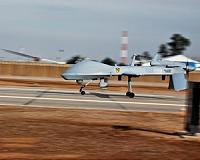| . |  |
. |
Washington (AFP) Dec 6, 2010 US diplomats play a major role in trying to prevent arms from reaching world hotspots, but cables released to The New York Times show an uphill battle against the likes of Iran, Syria and North Korea. In one cable given to the paper by WikiLeaks, Syrian President Bashar al-Assad is reprimanded for supplying sophisticated weapons to the Shiite militant group Hezbollah one week after providing assurances he would not. "In our meetings last week it was stated that Syria is not transferring any 'new' missiles to Lebanese Hezbollah," said the cable sent by US Secretary of State Hillary Clinton in February. "We are aware, however, of current Syrian efforts to supply Hezbollah with ballistic missiles. I must stress that this activity is of deep concern to my government, and we strongly caution you against such a serious escalation." A senior official at the Syrian foreign ministry rejected the allegations, but nine months on the flow is unchecked, The New York Times said, citing Pentagon officials. US diplomats, the cables reveal, are constantly confronting foreign governments about shadowy front companies and banks suspected of involvement in the illegal arms market but successes are rare. Diplomats have attempted to stop a Serbian black marketeer selling sniper rifles to Yemen, China selling missile technology to Pakistan, and India exporting chemicals that could be used to make poison gas. They expressed repeated concern that the Palestinian militant group Hamas was receiving weapons on huge cargo planes operated by Sudan's Badr Airlines. Despite Sudan's insistence the cargo was agricultural machinery, the United States asked other countries in the region to deny overflights but Yemen declined, according to a February 2009 cable released to The New York Times. In another, dated April 2009, Egypt accuses Iran of providing 25 million dollars a month to Hamas and links Tehran to a Hezbollah arms smuggling cell. The cables shed light on how North Korea uses the Korea Mining Development Corporation as a front for its operations, relying on steel and machinery parts from China, Japan and Switzerland and Taiwan. Diplomatic protests about North Korea's sale to Sri Lanka of rocket-propelled launchers and to Yemen of Scud missile launchers went unheeded in early 2009, cables show, according to The New York Times. "Chinese banks have been targeted by North Korea as the main access point into the international financial system," said a July 2009 cable from senior US Treasury official Stuart Levey. But the principal concern appeared to be Hezbollah and Syria, who President Barack Obama has sought to engage as part of his efforts to foster a wider peace in the Middle East. "Syria's determined support of Hezbollah's military build-up, particularly the steady supply of longer-range rockets and the introduction of guided missiles could change the military balance and produce a scenario significantly more destructive than the July-August 2006 war," said a November 2009 cable from diplomatic staff in Damascus. A particularly grave concern was that Hezbollah had been provided with sophisticated Fatah-110 missiles, which are deadly accurate and would have the capacity to strike Tel Aviv. The New York Times said that, according to a Pentagon official, Hezbollah's arsenal now includes some 50,000 rockets and missiles, including some 40 to 50 Fatah-110 missiles and 10 Scud-D missiles. "The newly fortified Hezbollah has raised fears that any future conflict with Israel could erupt into a full-scale regional war," the report said.
Share This Article With Planet Earth
Related Links The Military Industrial Complex at SpaceWar.com Learn about the Superpowers of the 21st Century at SpaceWar.com
 US Army Awards Delivery Order For Common Sensor Payload
US Army Awards Delivery Order For Common Sensor PayloadMckinney TX (SPX) Dec 06, 2010 Raytheon has been awarded a $42.9 million delivery order for 57 Common Sensor Payload electro-optical and infrared sensor systems. The order is part of a contract awarded by the U.S. Army in November 2007, with options worth up to $1.2 billion. The systems will actively support U.S. troops engaged in Operation Enduring Freedom and Operation Iraqi Freedom as they work to maintain stable civ ... read more |
|
| The content herein, unless otherwise known to be public domain, are Copyright 1995-2010 - SpaceDaily. AFP and UPI Wire Stories are copyright Agence France-Presse and United Press International. ESA Portal Reports are copyright European Space Agency. All NASA sourced material is public domain. Additional copyrights may apply in whole or part to other bona fide parties. Advertising does not imply endorsement,agreement or approval of any opinions, statements or information provided by SpaceDaily on any Web page published or hosted by SpaceDaily. Privacy Statement |